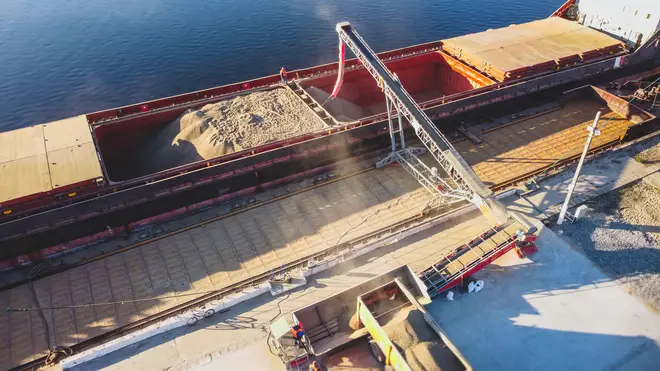
Paul Brand 10am - 12pm
31 October 2022, 09:00 | Updated: 31 October 2022, 09:10

Russia has said it’s suspending its involvement in an internationally-brokered grain deal following attacks on its Black Sea Fleet - as a government minister spoke of the ongoing "upheaval" to the UK's food and energy markets.
News of the collapse follows what’s described as a ‘massive’ drone attack on Russia’s Black Sea Fleet, located in Sevastopol, Crimea, over the weekend.
It comes as Russia launched missile strikes across Ukraine overnight in retaliation, including attacks on the nation’s capital, Kyiv.
Ukraine has so far not taken responsibility for the attack and President Volodymyr Zelensky called the Russian claims "rather predictable".
Russia also accused British troops of being involved in Saturday's Black Sea attack, providing no evidence to back up their claims.
Read more: Calls for urgent investigation over claims Liz Truss' phone was hacked by Russian spies

Minister: 'Upheaval' in food and energy markets will continue
A statement by the foreign ministry in Moscow said: "The Russian side cannot guarantee the safety of civilian dry cargo ships participating in the 'Black Sea Initiative', and suspends its implementation from today for an indefinite period."
It added: "in connection with the actions of the Ukrainian armed forces, which were led by British specialists", describing the actions "directed... against Russian ships that ensured the functioning of the said humanitarian corridor".
Speaking with Nick Ferrari at Breakfast, environment minister Mark Spencer commented on the international ramifications of the collapse of the grain deal, citing the need for the UK to “protect itself” from similar situations in the future.
“While we have people like Vladimir Putin who act in such an outrageous way and to commit abhorrent acts of war, we are going to see this upheaval in food and energy markets,” said Spencer.

“Which is why we need to try and protect ourselves from that by using the technologies available to us.”
The minister was speaking in line with the government’s push for ‘food security’, as the third reading of the Genetic Technology Bill – focussing on the use of gene-editing in crops and produce – is scheduled for Monday (31 October).
The new technologies are aimed at speeding up traditional breeding methods when it comes to food production.